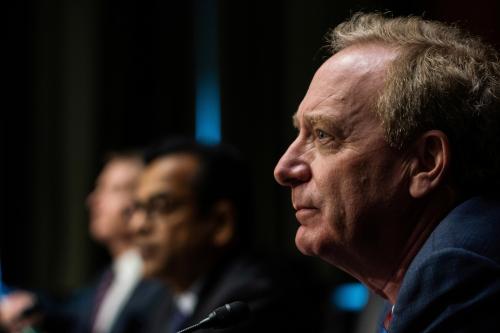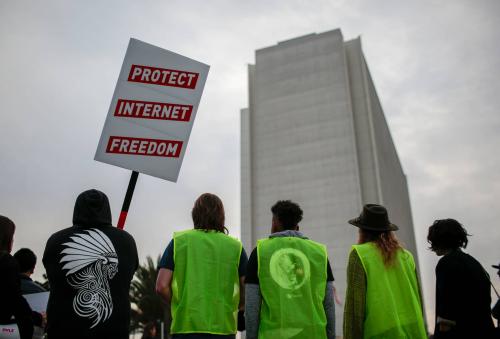News that Elon Musk bought Twitter could usher in substantial changes for the social media platform. Given its influential role in public conversation and policy actions, a shift in management control could have substantial consequences for the role of social media. Here are five things that could happen under Musk’s ownership.
Weaken Content Moderation in Name of Free Speech
Musk brings a strong free speech perspective that likely would alter some of the firm’s current content moderation policies. In the face of public concern over extremism, violence, hate speech, and false information, Twitter and other large social media platforms have strengthened their content moderation policies to remove content that encourages violence or spreads misinformation.
While many of those worried about the corrosive impact of social media on national and global discourse have applauded these moves, some free speech advocates have questioned these practices on grounds that more, not less speech, is desired—and that private companies shouldn’t be the arbiters of truth and justice.
Musk himself has advocated for stronger protections of freedom of speech on social media platforms and presumably would move the company closer to his perspective when he becomes its new owner. He likely would remove some of the content moderation practices and be less likely to remove tweets that, to him, fall within a gray area.
Bring Donald Trump Back to Twitter
One winner of an ownership change could be former President Donald Trump. Right now, Twitter has imposed a lifetime ban on Trump due to his role in inciting violence on January 6, 2021. After protesters stormed the Capitol and temporarily stopped Congress’ presidential election certification, Twitter executives said Trump had violated its terms of service and kicked him off the platform.
But under Musk, the company could revisit that decision and reinstate the former president on the grounds he is a leading public figure, has important things to say, and is a likely presidential candidate in 2024. If reinstated, that would give Trump a large megaphone to proclaim his views, spread lies and misinformation about the integrity of the 2020 election, and inflame public passions. The consequence could be sharper polarization, more intense partisanship, and a rise of political extremism.
Cozy Up to China
Unlike many leaders of large businesses, Musk has cultivated close ties with China and is building a large Tesla plant there. China is a global leader in the manufacturing of electric vehicle batteries, and Musk has expanded his dealings with China despite human rights concerns and fair labor practices.
The impact of an ownership change could be a different perspective on geopolitics than currently is the case. Musk could push policies that are more sympathetic to China, less restrictive towards Russia, or less supportive of human rights and environmental protection. He could introduce algorithms that favor content with a particular foreign policy take to the exclusion of alternative viewpoints. To his credit, though, Musk has promised to “open up” the algorithms so that they are more transparent. That would be a positive move for the social media platform.
Weaken accountability by taking company private
Musk plans to take Twitter private when he assumes ownership. If that became the case, there would be less public transparency about what happens, fewer reporting requirements, and more secrecy in regard to corporate practices. One of the byproducts of being a private firm is less oversight by government agencies and more freedom to make decisions. With a company as influential as Twitter, that could have ramifications for public discussion and electoral discourse.
Encourage space travel and push for AI limits
New management likely would push the platform towards Musk’s well-known personal interests in space travel and antipathy towards AI. SpaceX already is a leader in private space exploration and Musk himself has talked about colonizing Mars and building a life presence beyond planet Earth. He likely would encourage space tourism in line with his business interests, and encourage people to think more broadly about the future of humanity. It is an open question how Twitter would deal with possible conflicts of interest with Musk’s other business holdings, but that is something that should be clarified during the regulatory review of this transaction.
In addition, Musk is on record as worrying about artificial intelligence and fearing its capacity to enslave humanity. He wants to put the brakes on the rapid expansion of AI without appropriate human safeguards. While advocates can debate the merits of either stance, there is little doubt that ownership of Twitter would put Musk in a stronger position to influence public discussions and shape policy towards AI and other emerging technologies.







Commentary
Five ways Elon Musk can transform Twitter
April 26, 2022